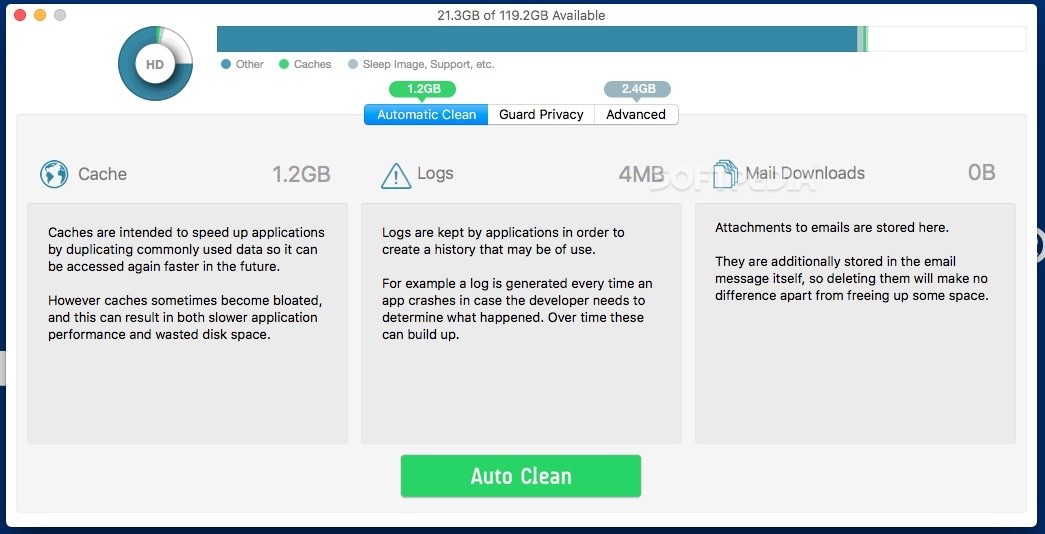

It is not only freeing disk space, but also increasing disk performance under certain circumstances.Ĭache files, application cache including browser cache is emptied.ĭisk Cleaner knows about the importance of your data. Disk Cleaner is removing these leftovers. With just a few clicks, Disk Cleaner can empty the following:Īny hard disk or SSD is filled with leftovers, files and snippets that are not needed anymore. After all, some of these data may be important and will be used again in the future. It is the only app available that is analyzing the browser cache before deleting it. The Disk Cleaner provides help with this decision.

Some of these files and data need to be analyzed wether you further need them or not.
#MAC DISK CLEANER FREE#
But it is not the best method to free space. Of course, deleting files can be done manually. And downloaded mails also use a lot of your drives capacity. Browser cache and browser preview rats a lot of space too. Therefore it should be emptied regularly. The trash is using a considerable amount of disk space as well. First of all are caches and logs from applications. There are several sources where this snippets and leftovers are coming from. Over time a lot of litter and clutter piles up on the hard disk.
#MAC DISK CLEANER MAC#
If you purchase your apps from the Mac App Store, deleteting them from here clears out their support files, too.Description Disk Cleaner is freeing your Macs Drive from Litter and Leftovers Changes in the latest update:Īs always, Disk Cleaner prompts you with a pop up where you can decide wether to delete the findings or to keep them.įree up tons of disk space with Disk Cleaner by removing gigabytes of unneeded files from your hard drive.ĭisk Cleaner by Power APP is the fastest disk cleaner app available! From there you can see how much space different types of content take up, and you can delete files and apps from here, too. Here’s what to do go to About this Mac, click the Storage tab, then click Manage next to your start up disk.
#MAC DISK CLEANER DOWNLOAD#
It’s available for download at the Maintain website.Īpple built a clean-it-up tool into macOS Sierra and High Sierra, but it isn’t obvious where to find it. Cocktail has a 10-use demo mode, and costs $19 for the unlocked version. status, enabling and disabling journaling, force-ejecting drives, and more. It also handles other taskes like checking hard rive S.M.A.R.T.
#MAC DISK CLEANER PLUS#
If you want to get rid of old log files it’ll do that, too, plus it can handle clearing out all of that old stuff on a schedule for you-handy if you know you want to periodically do some digital house cleaning. AppTrap is a free download.Ĭocktail is like an all-in-one package for helping your Mac run smoothly, and it can clean out old cache files users, the internet, applications, the system. If you say yes, it moves all of those extra pieces into the trash for you. It runs in the background and when you toss an app into the trash it asks if you want to get rid of its support files, too. AppTrap fixes that by keeping track of the hidden support files you apps make. Apps can leave behind support, log, and settings files you won’t ever see if you don’t know where to look-and the space they use adds up over time. If you’re running macOS 10.12 or higher you’ll need to use the test builds.ĭeleting apps from your Mac is as simple as dragging them to the trash. OmniDiskSweeper is a free download at the Omni website. You can choose what you want to delete in the app, but be careful because it’ll dutifully delete whatever you want even if it’s a critical file. OmniDiskSweeper lets you see what’s taking up all your hard drive or SSD space by size in descending order, so you’ll know right away where most of your storage space is going. OmniDiskSweeperįiles seem to breed like rabbits on our Macs and over time stuff we don’t really need any more can consume all of our available storage space. Luckily there are some useful tools out there to help get rid of the old stuff you don’t want any more, be it apps, support files, caches, logs, or any other document taking up space. Our Macs tend to be pretty self sufficient when it comes to maintenance and clearing out old support files, but sometimes our hard drive or SSD seems mysteriously too full.


 0 kommentar(er)
0 kommentar(er)
